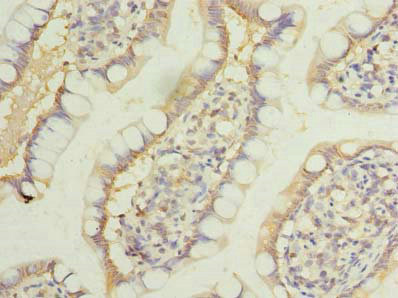LRRC39 Antibody
-
货号:CSB-PA822195LA01HU
-
规格:¥440
-
促销:
-
图片:
-
其他:
产品详情
-
产品名称:Rabbit anti-Homo sapiens (Human) LRRC39 Polyclonal antibody
-
Uniprot No.:Q96DD0
-
基因名:LRRC39
-
别名:LRRC39 antibody; UNQ6500/PRO21368 antibody; Leucine-rich repeat-containing protein 39 antibody; Myosin-interacting M-band-associated stress-responsive protein antibody; Myomasp antibody
-
宿主:Rabbit
-
反应种属:Human
-
免疫原:Recombinant Human Leucine-rich repeat-containing protein 39 protein (1-335AA)
-
免疫原种属:Homo sapiens (Human)
-
标记方式:Non-conjugated
本页面中的产品,LRRC39 Antibody (CSB-PA822195LA01HU),的标记方式是Non-conjugated。对于LRRC39 Antibody,我们还提供其他标记。见下表:
-
克隆类型:Polyclonal
-
抗体亚型:IgG
-
纯化方式:>95%, Protein G purified
-
浓度:It differs from different batches. Please contact us to confirm it.
-
保存缓冲液:Preservative: 0.03% Proclin 300
Constituents: 50% Glycerol, 0.01M PBS, PH 7.4 -
产品提供形式:Liquid
-
应用范围:ELISA, IHC
-
推荐稀释比:
Application Recommended Dilution IHC 1:20-1:200 -
Protocols:
-
储存条件:Upon receipt, store at -20°C or -80°C. Avoid repeated freeze.
-
货期:Basically, we can dispatch the products out in 1-3 working days after receiving your orders. Delivery time maybe differs from different purchasing way or location, please kindly consult your local distributors for specific delivery time.
相关产品
靶点详情
-
功能:Component of the sarcomeric M-band which plays a role in myocyte response to biomechanical stress. May regulate expression of other M-band proteins via an SRF-dependent pathway. Important for normal contractile function in heart.
-
基因功能参考文献:
- Reveal myomasp/LRRC39 as a previously unrecognized component of an M-band-associated signaling pathway that regulates cardiomyocyte gene expression in response to biomechanical stress. PMID: 20847312
-
亚细胞定位:Cytoplasm, myofibril, sarcomere, M line.
-
组织特异性:Highly expressed in skeletal muscle and heart. Not detected in other tissues tested.
-
数据库链接:
HGNC: 28228
KEGG: hsa:127495
STRING: 9606.ENSP00000344470
UniGene: Hs.44277
Most popular with customers
-
-
YWHAB Recombinant Monoclonal Antibody
Applications: ELISA, WB, IF, FC
Species Reactivity: Human, Mouse, Rat
-
-
-
-
-
-






















